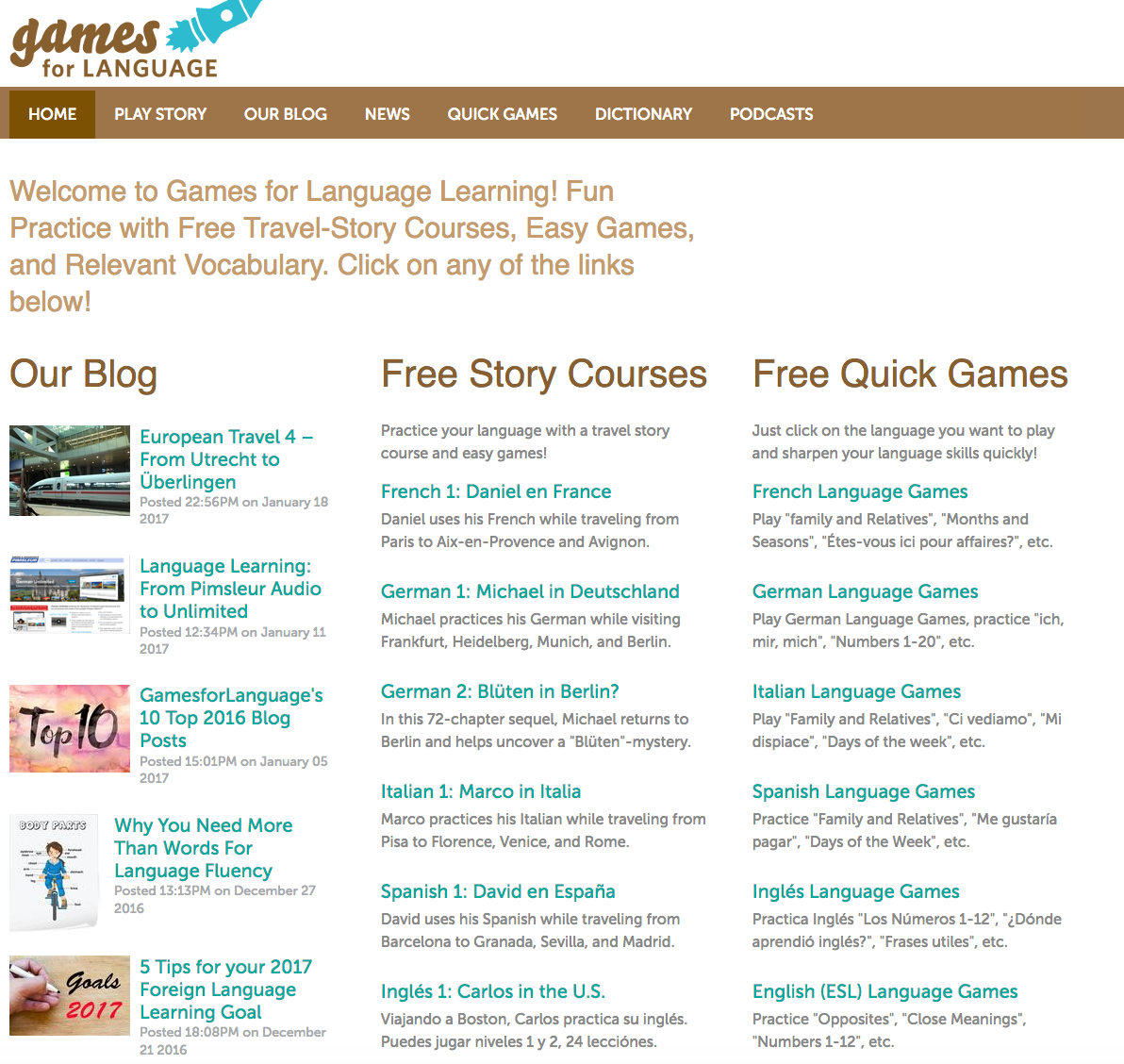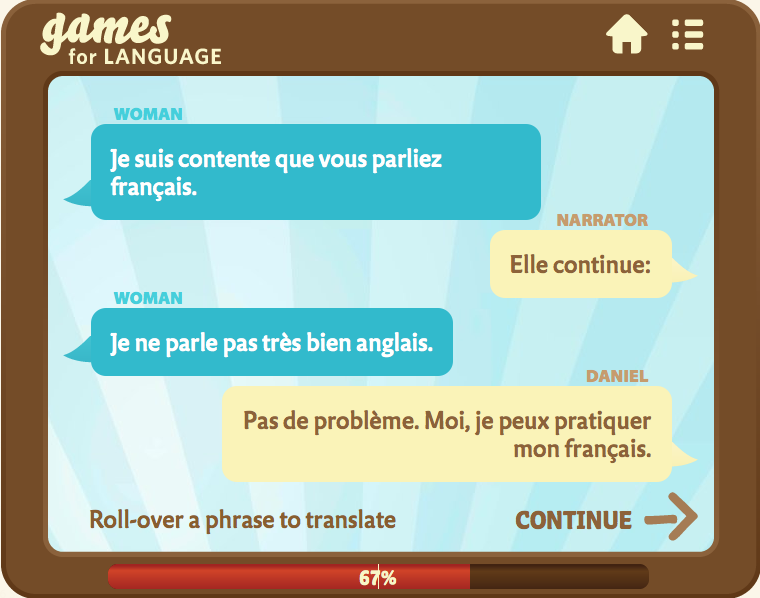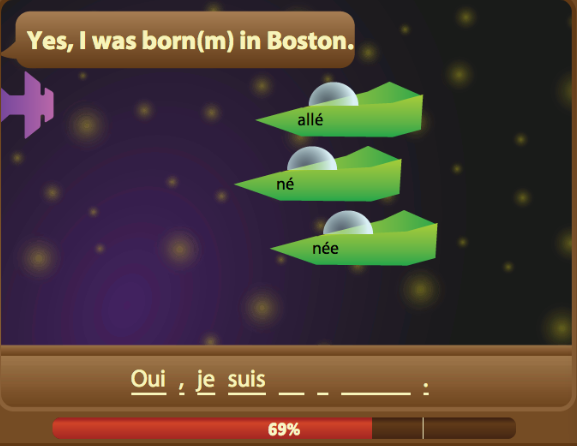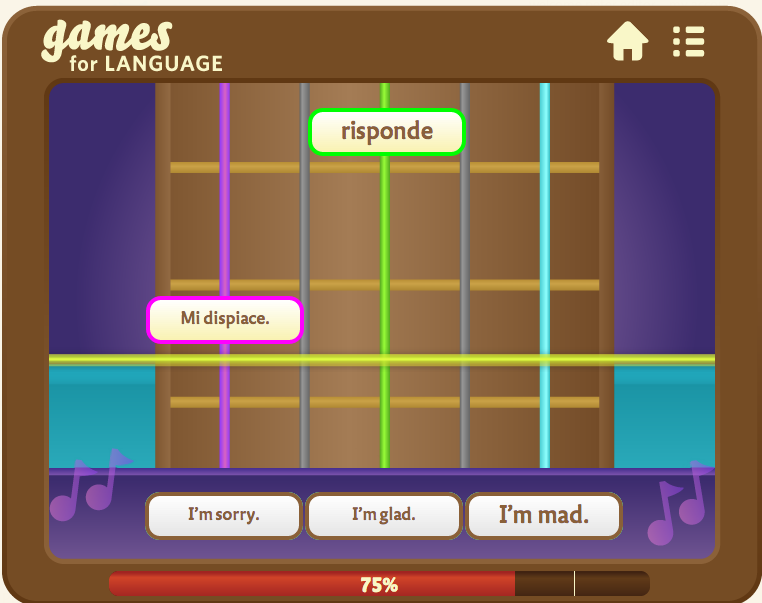Games for Language Learning – 5 Years later
 It's been five years since we went live with our GamesforLanguage site. It's time to step back a little and have a look at how "fun and effective" our games for language learning really are.
It's been five years since we went live with our GamesforLanguage site. It's time to step back a little and have a look at how "fun and effective" our games for language learning really are.
GamesforLanguage started out as an experiment and family project: A college language teacher and language course writer/editor, a retired engineer/consultant, a computer programmer (our son) and his graphic designer wife put an idea into action:
Listen, read and repeat story dialogues, learn and practice vocabulary with simple interactive games.
We get feed-back that our games are "fun." But how effective are they for learning the 4 language skills: Listening, Speaking, Reading, and Writing? And how much new vocabulary does a player learn and remember? We'll take a stab at some answers below.
WHO CAN BEST LEARN WITH GAMESFORLANGUAGE?
Language learners are a varied group of people. Players that come to our site (and have told us) range from 14 to 80 years old and come from diverse backgrounds. Some already know other languages, others are learning their first foreign language. And, some are not native speakers of English, but seek to improve their knowledge of English while learning French, Italian, German, or Spanish.
We have players of our courses that come back again and again, schools that have their classes practice with us, and learners that systematically go through all our Quick Games.
We also have users that try us a for a bit and then move on.True Novices may find the entry into and progression through GamesforLanguage a bit hard.
 Learners who've had some contact with the language before (in school or college,on travels, through self-study) seem to do well.
Learners who've had some contact with the language before (in school or college,on travels, through self-study) seem to do well.
They want to pick up the language again, practice vocabulary in an engaging way, and improve their listening and speaking skills. (The general range of our users is from beginner to low intermediate; in the Common European European Framework of Reference for Languages that means: A1, A2, B1.)
For adults, learning a language is more about persistence than cramming. We generally recommend that a learner do only ONE NEW lesson (Scene) per day and redo earlier Scenes or Games that have less than a 100% score.
Each of the Story-Courses teaches over 700 new words. Learners that practice fairly regularly and like the game aspect appear to make good progress.
But what kind of learning goes on, and progress in what?
LISTENING COMPREHENSION
 GamesforLanguage provides useful tools for building listening comprehension. This may indeed be our strongest feature. We have audio for everything, from individual words, to phrases, to the initial conversations at the beginning and end of the lessons (Scenes).
GamesforLanguage provides useful tools for building listening comprehension. This may indeed be our strongest feature. We have audio for everything, from individual words, to phrases, to the initial conversations at the beginning and end of the lessons (Scenes).
When training to listen, our brains go into gear to find sound patterns. The more you listen, the better you start noticing the patterns.
You begin to hear what clusters of sound are typical for the language you're learning. You start to notice what sounds go together to make words, where words start and end, where sentences begin and finish.
It's important to hear individual words in isolation, as well as hearing them in the stream of phrases and sentences. When people speak rapidly, the sounds of individual words get "swallowed up", sounds change or simply get lost.
A goal is to understand the meaning of the sounds you hear, which happens best  when you get comprehensible input. Part of that is becoming aware of meaningful grammatical patterns. Are things happening now, or did they happen some time in the past? Is the statement a negation? A question, a request, an opinion?
when you get comprehensible input. Part of that is becoming aware of meaningful grammatical patterns. Are things happening now, or did they happen some time in the past? Is the statement a negation? A question, a request, an opinion?
There are various ways to practice listening with GamesforLanguage. Once you've gone through a Level (6 lessons), you can listen to the Podcast. You'll understand most of it as you've already practiced all the words and sentences. So now you can close your eyes and just listen. This is a powerful way to build listening skills.
Or if you also want to read what is being said, go back and play just the conversations, one after the other. You don't automatically get translations, but you can check, if necessary.
SPEAKING
You won't become fluent just by using GamesforLanguage. Well, no online program can make you talk like a native. To become a fluent conversationalist, you have to SPEAK with live partners, often, and about a variety of topics.
But GamesforLanguage does give you the tools to get started, to help you work on your pronunciation by having you SAY and INTERNALIZE phrases and sentences you can use in daily life.
You're encouraged to repeat everything OUT LOUD, every word, phrase, and sentence. By imitating the pronunciation of the speakers, you begin to attune your ear and to work your mouth to make the right sounds.
The clue really is to speak out loud, to repeat, and to repeat again. Sure, there are many ways to learn vocabulary - from using flashcard apps to writing out your own flashcards. These are good ways to review new words on the go, whenever you have a few minutes.
But to practice speaking, you have to schedule some quiet time for yourself and to use that to really focus on the sounds you're making!
The best tool for learning to speak may be finding a way to record your voice. Then playing back what you've said. You can do this with the words and sentences of the travel-story, then play back each sentence.
One of our young users learning Italian complained that she "hated to hear" her own voice. We agree, it does take getting used to hearing one's own voice, especially in another language.
It's worth overcoming your reluctance. You can improve your spoken language noticeably, just by spending 20 minutes, recording your own voice and playing it back. For example, do a sentence five, six times, and try to capture the melody of what's being said rather than saying each word distinctly, etc. To boot, close your eyes while you listen and talk. It really helps.
READING
Since everything is in written form, GamesforLanguage gives learners a way to start connecting sound to spelling. 
With time, you'll start noticing patterns in how words are spelled in relation to their sound. That's just a start, though. Next, you'll need to find a way to continue to read texts that are increasingly challenging.
Learning to read in a foreign language is a wonderful achievement. It's a way to learn a ton of vocabulary. Once you know the written language, you have access to many resources in the form of books, stories, articles, comments, letters/emails etc. printed or online.
Most importantly, you can now chose, what really interests you, a key for staying engaged and motivated.In many programs, vocabulary is taught in groups of topics: Greetings, food animals,  body parts, professions, etc. Some of our Quick Games do that as well.
body parts, professions, etc. Some of our Quick Games do that as well.
But GamesforLanguage introduces words and phrases mostly in context by using a STORY. It's a different way and interesting way of getting into a language.
While it's important to learn specific vocabulary, we've always found that we remember words, phrases, and sentences better when we hear them in the context of a conversation or a story. That's why our lessons are, in fact, Scenes of an ongoing travel story. (Our German 2 course "Blüten in Berlin?" is a mystery-story sequel to the German 1 travel-story.)
WRITING
 To augment GamesforLanguage's short writing games, we recommend that you keep a notebook on the side or create your own written flashcards with phrases and sentences.
To augment GamesforLanguage's short writing games, we recommend that you keep a notebook on the side or create your own written flashcards with phrases and sentences.
The short writing game we have in each lesson is a fun and easy way to get started with spelling.
Two of our games - Word Invader and Shootout - ask the learner to build sentences word by word.
These require the player to choose the correct grammatical form for each word, such as feminine vs. masculine, the verb with the right personal ending, a present or past tense form, subject or object form, etc.
When playing, you also practice word order. Some sentences in other languages follow the English, many do not. German is a case in point, but Romance languages also have their word-order idiosyncrasies.
MEMORIZATION
Programs with Spaced Repetition Systems (SRSs) have become very popular. An algorithm keeps track of the words you learn and the mistakes you make.
 You're asked to recall the words at a specific time. The goal is to get the words into your long-term memory.
You're asked to recall the words at a specific time. The goal is to get the words into your long-term memory.
GamesforLanguage does not (yet) have an SRS. We do have several memorization and built-in recall games, but the spacing is not personalized.
To really memorize new words, you have to do more than just play through a game once or twice. You have to make new words your own and start using them actively.
The vocabulary of our early lessons is on Quizlet, for those who like to practice vocabulary more intensively.
Another good method for remembering new words is to write them out (either in a notebook or on small flashcards).
In "Fluent Forever," Gabriel Wyner suggests that by writing out your own flashcards, you'll have a much easier time remembering words. He also says that he reviews his flashcards, in increasing intervals, for a full year before he stops completely. Even Polyglots need to review multiple times.
PARTNER SITES
We know that no program can be everything to everyone. We also use other sites to learn and practice our languages. With some sites we have established partnership arrangements.
With other free sites like Lingohut we sometimes share blog posts and tips. Our revenue-share arrangements with selected fee-for-service sites or apps, which we mention in our Dictionary and Quick Games, give us a (small) benefit. They help keep our site otherwise ad-free and provide our users with learning options that we use and like ourselves.
PAST AND FUTURE GAMES FOR LANGUAGE LEARNING
GamesforLanguage is a labor of love and totally free. For us, working on the site is a way to learn, discover, and do what we enjoy. It keeps us in touch with new insights about how adults learn languages that we can share with others.
Right from the beginning, we've been working with a wonderful team of native-speaker collaborators.
Since our early days, we've added a language-learning Blog that now has bi-monthly posts, as well as Podcasts of the stories, and over 200 Quick Language Games.
We've also continuously tweaked our Travel-Story Courses following input from users.
We decided early on to forgo the development of a GamesforLanguage app. Instead, we're relying on the increasing availability of free WiFi and the mobile-friendly design of our web-based program. And, we'll continue to add new content.
And while we're always thinking about ways to enhance language learning, we also believe that Gabriel Wyner is correct when he notes in "Fluent Forever":
"No one can give you a language; you have to take it yourself. You are rewiring your brain. To succeed, you need to actively participate. Each word in your language needs to become your word, each grammar rule your grammar rule."
We hope that our GamesforLanguage site is a fun and useful resource for anyone who wants to learn and practice French, German, Italian, and Spanish for free. We always welcome feedback and suggestions for improving and expanding our site, so leave a comment right here!
Bio: Ulrike & Peter Rettig are co-founders of Gamesforlanguage.com. They are lifelong language learners, growing up in several European countries before moving to Canada and the United States. You can follow them on Facebook, Twitter, and Instagram.
